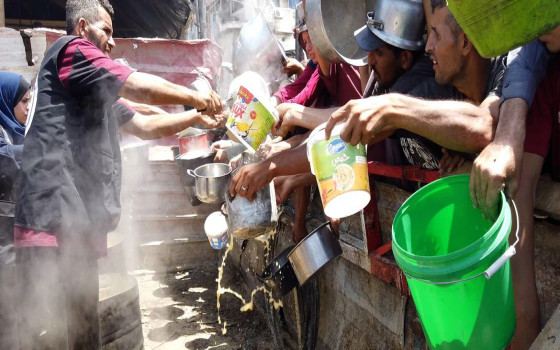
Hunger Lines in Gaza: Continuous Daily Suffering... Increasing Death Toll Among Those Desperate for Food

- Europe and Arabs
- Friday , 1 August 2025 7:29 AM GMT
Gaza - New York: Europe and the Arabs
In the western areas of Gaza City, where displaced people are crowded into cramped tents, an indescribable human tragedy unfolds. Here, where earning a living has become a daily struggle, hundreds of men, women, and children stand in endless queues, under the scorching sun, outside the few community kitchens that serve only lentil soup.
A correspondent for the UN's daily news bulletin in Gaza visited one of the community kitchens and documented painful scenes of the displaced people's suffering, their cries for help, and their urgent appeals to the world, asking for an end to their tragedy and relief.
"Where is the world? We are dying of hunger here."
Community kitchen workers are busy preparing lentil soup, while plastic containers and empty plates are piled up behind an iron fence, waiting for a small amount of this soup that many may never be able to get a sip of. After a bitter struggle, Ziad Al-Ghariz, an elderly displaced person from Gaza, managed to obtain a cup of lentil soup. He sat on the floor and began to take slow sips. He said, "I haven't tasted bread for ten days." He continued, "I eat the lentil soup distributed by the community kitchen. I can't afford flour at all; I don't have the money for it, so I try to get whatever the kitchen distributes. The people of Gaza are hungry.
According to the latest findings from the United Nations Relief and Works Agency for Palestine Refugees (UNRWA), one in five children in Gaza City is malnourished, with cases increasing daily.
According to a warning issued by the Integrated Food Security Phase Classification, Gaza is at serious risk of famine, with food consumption and nutrition indicators reaching their worst levels since the beginning of the current conflict.
The alert highlights that two of the three famine thresholds have been exceeded in parts of the Gaza Strip, with the World Food Programme and the United Nations Children's Fund (UNICEF) warning that time is running out to launch a comprehensive humanitarian response.
The UN Secretary-General said the alert confirms "what we fear: Gaza is on the brink of famine." He said the facts are undeniable, and that Palestinians in Gaza are suffering a humanitarian catastrophe of epic proportions. He added: "This is not a warning, but a reality unfolding before our eyes."
He stressed the need for food, water, medicine, and fuel to flow "in waves and without impediments." This nightmare must end.
The United Nations Office for the Coordination of Humanitarian Affairs (OCHA) said that days after the start of the tactical pauses announced by the Israeli authorities in Gaza, "we continue to see casualties among those seeking assistance and more deaths from hunger and malnutrition."
The UN office said that parents continue to struggle to save their starving children. Desperate and hungry people continue to unload small amounts of aid from trucks that manage to exit the crossings.
Although the UN and its partners are taking advantage of every opportunity to support those in need during the unilateral tactical pauses, the conditions for delivering aid and supplies are far from adequate, according to OCHA.
UN humanitarian agencies have warned that the Gaza Strip is on the brink of famine, based on the latest Integrated Food Security Phase Classification (IPC) information. They noted that 96% of households surveyed during the first two weeks of July experienced moderate to high levels of water insecurity—a 3% increase compared to June.
The UN human rights office said that at least 1,373 Palestinians have been killed since May 27 while trying to obtain food, including 859 in the vicinity of Gaza Humanitarian Foundation sites and 514 along food aid convoy routes. The office stated on its website that "Israeli forces committed the vast majority of these crimes." Israeli forces continue to fire and shell Palestinians along food aid convoy routes and around the Gaza Humanitarian Foundation sites.
He said this is happening despite the Israeli military's announcement in July of a "temporary pause in military operations" during specific hours "to improve the humanitarian response."
The United Nations Relief and Works Agency (UNRWA) said the "famine" in Gaza is entirely man-made. It stressed the need to allow the United Nations, including UNRWA, to do its work so that aid can safely reach those most in need, including one million starving children.
Juliet Touma, UNRWA's Director of Public Information and Communications, said, "Airdrops are completely unnecessary, ineffective, costly, and risky."
She noted that there is a "safer, faster, and more dignified way to deliver aid by land." She said that the United Nations, including UNRWA, was able to bring in between 500 and 600 trucks daily during the ceasefire earlier this year.
The Protection Cluster warned that the airdrops Airstrikes can kill or injure civilians and are insufficient in scale to meet the vast needs inside Gaza.
More than 60,000 Palestinians killed
The United Nations Office for the Coordination of Humanitarian Affairs reported that Israeli forces continued their intensive aerial, land, and sea bombardment of the Gaza Strip over the past week, coinciding with ongoing ground operations.
Palestinian armed groups also fired rockets into Israel and clashed with Israeli forces. Since July 20, Israeli authorities have not issued any new evacuation orders.
According to the Ministry of Health in Gaza, 640 Palestinians were killed and 3,224 others were injured between July 23 and 30. The total death toll since October 7 has reached at least 60,138 Palestinians, and 146,269 others have been injured, according to the ministry.
Since the beginning of the war, the World Health Organization reported that 7,460 patients, including 5,160 children, have been evacuated from Gaza for treatment abroad.












No Comments Found